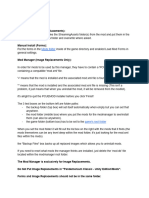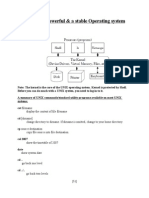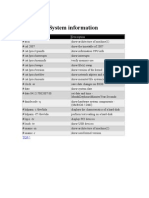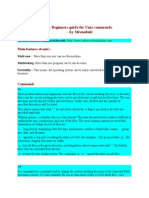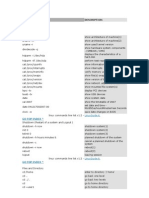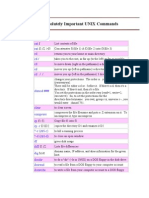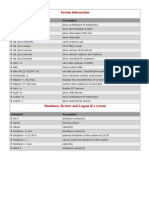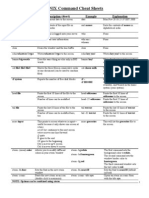0 ratings0% found this document useful (0 votes)
54 viewsUnix/Linux Quick Tutorial: 1. Directory
This document provides a tutorial on basic Unix/Linux commands for directories, files, and other system operations. It covers commands for making and deleting directories, listing and copying files, searching and compressing files, running processes in the background, viewing command history, and checking available disk space. The tutorial is organized into sections on directories, files, and miscellaneous commands.
Uploaded by
tej29Copyright
© Attribution Non-Commercial (BY-NC)
Available Formats
Download as PDF, TXT or read online on Scribd
0 ratings0% found this document useful (0 votes)
54 viewsUnix/Linux Quick Tutorial: 1. Directory
This document provides a tutorial on basic Unix/Linux commands for directories, files, and other system operations. It covers commands for making and deleting directories, listing and copying files, searching and compressing files, running processes in the background, viewing command history, and checking available disk space. The tutorial is organized into sections on directories, files, and miscellaneous commands.
Uploaded by
tej29Copyright
© Attribution Non-Commercial (BY-NC)
Available Formats
Download as PDF, TXT or read online on Scribd
You are on page 1/ 4
Unix/Linux Quick Tutorial
By
Dr. Oscar M.K. Law
School of Electronics and Computer Engineering Technology
Seneca College of Applied Arts and Technology
Ver. 0.1
1. Directory:
1.1 Make Directory
% mkdir <dir> # create directory <dir>
1.2 Delete Directory
% rmdir <dir> # delete directory <dir>
1.3 Change Directory
% cd <dir> # change to directory <dir>
% cd . # change to current directory
% cd .. # change to parent directory
1.4 Display Current Directory
% pwd # display current directory path
2. Files
2.1 List Files
% ls # list files of current directory
% ls –a # list files (include hidden) of current directory
% ls –l # list files of current directory in long list format
% ls –lrt # list files of current directory in long list format with order
% ll # ls –l alias command
% ls <dir> # list files of sub-directory <dir>
% ls . # list files of current directory
% ls .. # list files of parent directory
% ls ~ # list files of home directory
% ls ~/<dir> # list files of sub-directory under home directory
2.2 Copy Files
% cp <file1> <file2> # copy <file1> to <file2>
% cp <dir>/<file> . # copy <file> from <dir> to current directory
% cp <dir1>/<file> <dir2> # copy <file1> from <dir1> to <dir2>
2.3 Move Files
% mv <file1> <file2> # rename <file1> to <file2>
% mv <dir>/<file> . # move file form <dir> to current directory
2.4 Delete Files
% rm <file> # delete <file>
% rm * # delete all files using wild card
% rm –r * # delete all files using wild card without warning
% rm [a-z]* # delete all file start with a to z
2.5 Concatenate Files
% cat <file> # display file on screen
% cat <file1> <file2> > <file3> # concatenate <file1> and <file2> to <file3>
2.6 Display File
% more <file> # display file on screen
% view <file> # view file on screen
2.6 Modify Files Security
% chmod <file> <cmd> # modify <file> security with <cmd>
where <cmd> <ugoa><+/-><rwx>
% chmod –R <cmd> <dir> # modify all file security under <dir> with <cmd>
2.7 Difference between Files
% diff <file1> <file2> # difference between <file1> <file2>
2.8 Search File
% find –name “<file>” –print # find <file> in all subdirectory
2.9 Compress File
% gzip <file> # compress file using gzip command
% gzip –f <dir> # compress all files under <dir> directory
% gunzip <file> # uncompress file using gunzip command
% gunzip –f <dir> # uncompress all files under <dir> directory
% tar –cvf <file> <dir> # compress all files under <dir> to file <file>
% tar –xvf <file> # uncompress file <file>
% tar –tvf <file> # list all files in uncompressed file <file>
3. Miscellaneous
3.1 Clear Screen
% clear # clear screen
3.2 Redirect
% <cmd> > <file> # redirect <cmd> results to <file>
% <cmd> >> <file> # append <cmd> results to <file>
% <cmd> < <file> # execute <cmd> from <file>
3.3 Pipe
% <cmd1> | <cmd2> # direct <cmd1> results to <cmd2>
3.4 Process
% ^c # kill current command by Control-C
% ^z # stop current command by Control-Z
% <cmd> & # run <cmd> in background
% bg # run command stop by Control-Z in background
% fg # foreground command in background
% jobs # list all background jobs
% kill # kill the background jobs
% kill -9 <jobs> # kill the background jobs without warning
3.5 History
% history # list command history
% !! # execute last command
% !<#number> # execute <#number> command in history list
3.6 System
% df # list space left on file system
% du * # list summary of file size in kilobyte
% du –s * # list summary of subdirectory size in kilobyte
You might also like
- Modding Pandemonium Classic Unity EditionNo ratings yetModding Pandemonium Classic Unity Edition4 pages
- Unix/Linux Command Reference: File Commands System InfoNo ratings yetUnix/Linux Command Reference: File Commands System Info5 pages
- Unix/Linux Command Reference: File Commands System InfoNo ratings yetUnix/Linux Command Reference: File Commands System Info2 pages
- Pharmsci571-Cadd: Essential Linux Commands: Some Important General Unix NotesNo ratings yetPharmsci571-Cadd: Essential Linux Commands: Some Important General Unix Notes11 pages
- UNIX Commands: CTRL+D - Possible Completer CTRL+C - Cancel Foreground Job CTRL+Z - Stop (Interrupted) A Foreground JobNo ratings yetUNIX Commands: CTRL+D - Possible Completer CTRL+C - Cancel Foreground Job CTRL+Z - Stop (Interrupted) A Foreground Job41 pages
- UNIX Commands: CTRL+D - Possible Completer CTRL+C - Cancel Foreground Job CTRL+Z - Stop (Interrupted) A Foreground Job100% (8)UNIX Commands: CTRL+D - Possible Completer CTRL+C - Cancel Foreground Job CTRL+Z - Stop (Interrupted) A Foreground Job41 pages
- UNIX Quick Reference Sheet: 2.4 Comparing FilesNo ratings yetUNIX Quick Reference Sheet: 2.4 Comparing Files4 pages
- A Comprehensive Guide to Essential Linux CommandsNo ratings yetA Comprehensive Guide to Essential Linux Commands28 pages
- UNIX BASICS - Beginners Guide For Unix Commands - by MeenakshiNo ratings yetUNIX BASICS - Beginners Guide For Unix Commands - by Meenakshi7 pages
- Command Line Interface (CLI) : CSCI N321 - System and Network AdministrationNo ratings yetCommand Line Interface (CLI) : CSCI N321 - System and Network Administration35 pages
- Linux and Bash Command Cheat Sheet - The BasicsNo ratings yetLinux and Bash Command Cheat Sheet - The Basics1 page
- Basic LINUX Commands and Its Use.: Course Teacher: SACNo ratings yetBasic LINUX Commands and Its Use.: Course Teacher: SAC8 pages
- System Information: Command DescriptionNo ratings yetSystem Information: Command Description20 pages
- UNIX Command Cheat Sheets: Command Description (Short) Example ExplanationNo ratings yetUNIX Command Cheat Sheets: Command Description (Short) Example Explanation8 pages
- Operating Systems Lab: Implement The Following Using C/C++/JAVANo ratings yetOperating Systems Lab: Implement The Following Using C/C++/JAVA22 pages
- Red Hat Enterprise Linux-8-Configuring and Managing Logical Volumes-En-UsNo ratings yetRed Hat Enterprise Linux-8-Configuring and Managing Logical Volumes-En-Us140 pages
- Introduction Into Files and Folders (Directory)100% (1)Introduction Into Files and Folders (Directory)17 pages
- Analyzing Master Boot Record For Forensic InvestigNo ratings yetAnalyzing Master Boot Record For Forensic Investig6 pages
- Instructions To Install CentOS Linux 9 On VMWare-2No ratings yetInstructions To Install CentOS Linux 9 On VMWare-222 pages
- Earlier.. We Are Having The sp-73 Issue.: Note 1629558 - Linux 3.x KernelNo ratings yetEarlier.. We Are Having The sp-73 Issue.: Note 1629558 - Linux 3.x Kernel4 pages
- Red Hat Enterprise Linux-8-Managing File systems-en-USNo ratings yetRed Hat Enterprise Linux-8-Managing File systems-en-US159 pages
- Unix/Linux Command Reference: File Commands System InfoUnix/Linux Command Reference: File Commands System Info
- Unix/Linux Command Reference: File Commands System InfoUnix/Linux Command Reference: File Commands System Info
- Pharmsci571-Cadd: Essential Linux Commands: Some Important General Unix NotesPharmsci571-Cadd: Essential Linux Commands: Some Important General Unix Notes
- UNIX Commands: CTRL+D - Possible Completer CTRL+C - Cancel Foreground Job CTRL+Z - Stop (Interrupted) A Foreground JobUNIX Commands: CTRL+D - Possible Completer CTRL+C - Cancel Foreground Job CTRL+Z - Stop (Interrupted) A Foreground Job
- UNIX Commands: CTRL+D - Possible Completer CTRL+C - Cancel Foreground Job CTRL+Z - Stop (Interrupted) A Foreground JobUNIX Commands: CTRL+D - Possible Completer CTRL+C - Cancel Foreground Job CTRL+Z - Stop (Interrupted) A Foreground Job
- UNIX BASICS - Beginners Guide For Unix Commands - by MeenakshiUNIX BASICS - Beginners Guide For Unix Commands - by Meenakshi
- Command Line Interface (CLI) : CSCI N321 - System and Network AdministrationCommand Line Interface (CLI) : CSCI N321 - System and Network Administration
- Basic LINUX Commands and Its Use.: Course Teacher: SACBasic LINUX Commands and Its Use.: Course Teacher: SAC
- UNIX Command Cheat Sheets: Command Description (Short) Example ExplanationUNIX Command Cheat Sheets: Command Description (Short) Example Explanation
- Operating Systems Lab: Implement The Following Using C/C++/JAVAOperating Systems Lab: Implement The Following Using C/C++/JAVA
- Red Hat Enterprise Linux-8-Configuring and Managing Logical Volumes-En-UsRed Hat Enterprise Linux-8-Configuring and Managing Logical Volumes-En-Us
- Analyzing Master Boot Record For Forensic InvestigAnalyzing Master Boot Record For Forensic Investig
- Instructions To Install CentOS Linux 9 On VMWare-2Instructions To Install CentOS Linux 9 On VMWare-2
- Earlier.. We Are Having The sp-73 Issue.: Note 1629558 - Linux 3.x KernelEarlier.. We Are Having The sp-73 Issue.: Note 1629558 - Linux 3.x Kernel
- Red Hat Enterprise Linux-8-Managing File systems-en-USRed Hat Enterprise Linux-8-Managing File systems-en-US
